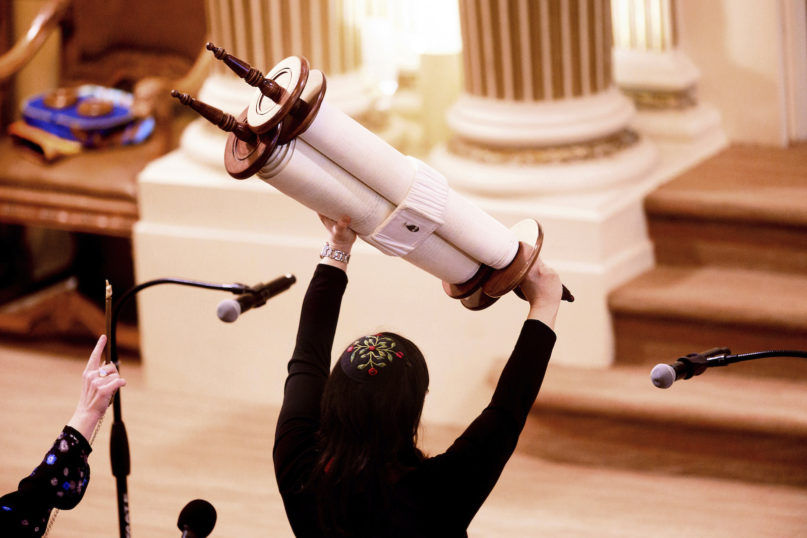(RNS) — Each Saturday, several members of a Jewish congregation are called up to the podium to bless the Torah before a portion of it is read aloud. This calling forward, called an aliyah, is considered an honor.
But the pronouns used to summon people in Hebrew are gendered. What’s a congregational leader to do when summoning a nonbinary person who identifies as neither exclusively male nor exclusively female?
Now the Conservative movement has formalized a series of Hebrew terms service leaders can use to call nonbinary people to Torah honors. The opinion by the Conservative movement’s Committee on Jewish Law and Standards provides common language that the country’s 560 Conservative synagogues can use.
The opinion, approved on May 25 by a vote of 24-0, represents another milestone in the inclusion of LGBTQ people in the Conservative movement, Judaism’s second-largest U.S. branch.
Calling people up to the Torah by name is a long-standing practice, the opinion states. “Today, we can avoid such situations of embarrassment and disrespect by calling people to the Torah in the way that they request to be called.”
The Conservative movement is the last of the liberal Jewish denominations to do so. The Reform movement, the United States’ largest Jewish branch, updated its use of gender appropriate language in 2015; Reconstructing Judaism, a smaller movement, provided guidelines for nonbinary Torah honors in 2017.
Even among Conservative synagogues, “there are many that are doing this already,” said Rabbi Robert Scheinberg, one of three rabbis who authored the opinion. “But communities that have been doing it differently than suggested might contemplate doing it the way we suggested.”
The opinion draws on the work of Rabbi Guy Austrian, who formulated his synagogue’s position in 2017 after it became obvious that more nonbinary Jews at his congregation, Fort Tryon Jewish Center in New York, were called to perform the honor.
“We didn’t have a standard way of calling them up in Hebrew,” said Austrian. “It was becoming increasingly awkward and inefficient. So we needed to think it through.”
Specifically, the opinion calls for a number of changes. People called to a Torah honor are referred to by their given name and then “son of” or “daughter of,” followed by their parents’ names. The new instruction recommends “mibeit,” Hebrew for “from the house of” followed by their parents’ names. In addition, when the service leader asks someone to stand it recommends a gender neutral “na la’amod,” instead of the gendered, “ya’amod,” or “t’aamod.”
The road to greater recognition of queer Jews in the Conservative movement began in 2006, when the movement’s Rabbinical Assembly began allowing its rabbis to officiate at same-sex marriages. In 2012 it published suggested language for ritual marriage and divorce ceremonies for same-sex couples. In 2016, the assembly passed a resolution calling for synagogues to be “explicitly welcoming” to transgender people.
In the most recent opinion, the rabbis noted that ideally an opinion on nonbinary language usage should be written by nonbinary rabbis, which was not the case this time. But they suggested such a future opinion would be welcome.
Rabbi Deborah Silver, one of the three authors of the opinion, said being called to the Torah in the presence of the entire congregation is a point of pride for many Jews.
“We want to make sure people are respected in that moment and that they can bring their whole selves to that moment,” said Silver, who serves at Shir Chadash, a Conservative synagogue in Metairie, Louisiana. “It’s impressive to be named by your community and to be known by your community in that way.”
The rabbis said the opinion may also serve as a signal to nonbinary Jews that they are taken seriously.
“They may not have not put themselves in that situation (of being called to the Torah) out of a concern that their identity will not be respected,” said Scheinberg. “Now, hopefully, they know it will be.”
RELATED: A shortage of Conservative rabbis has Jews reexamining the pulpit role





